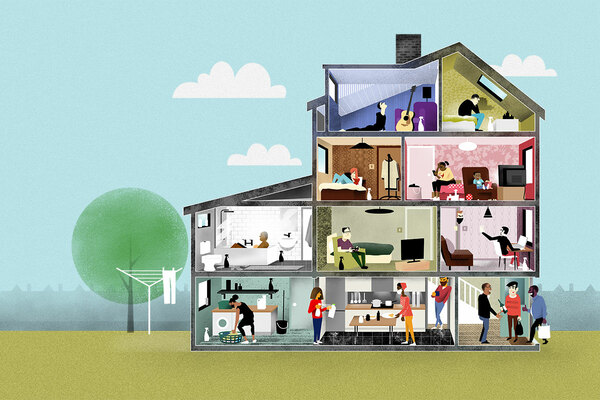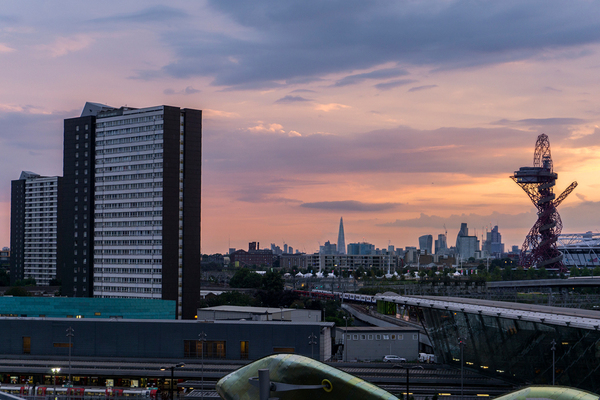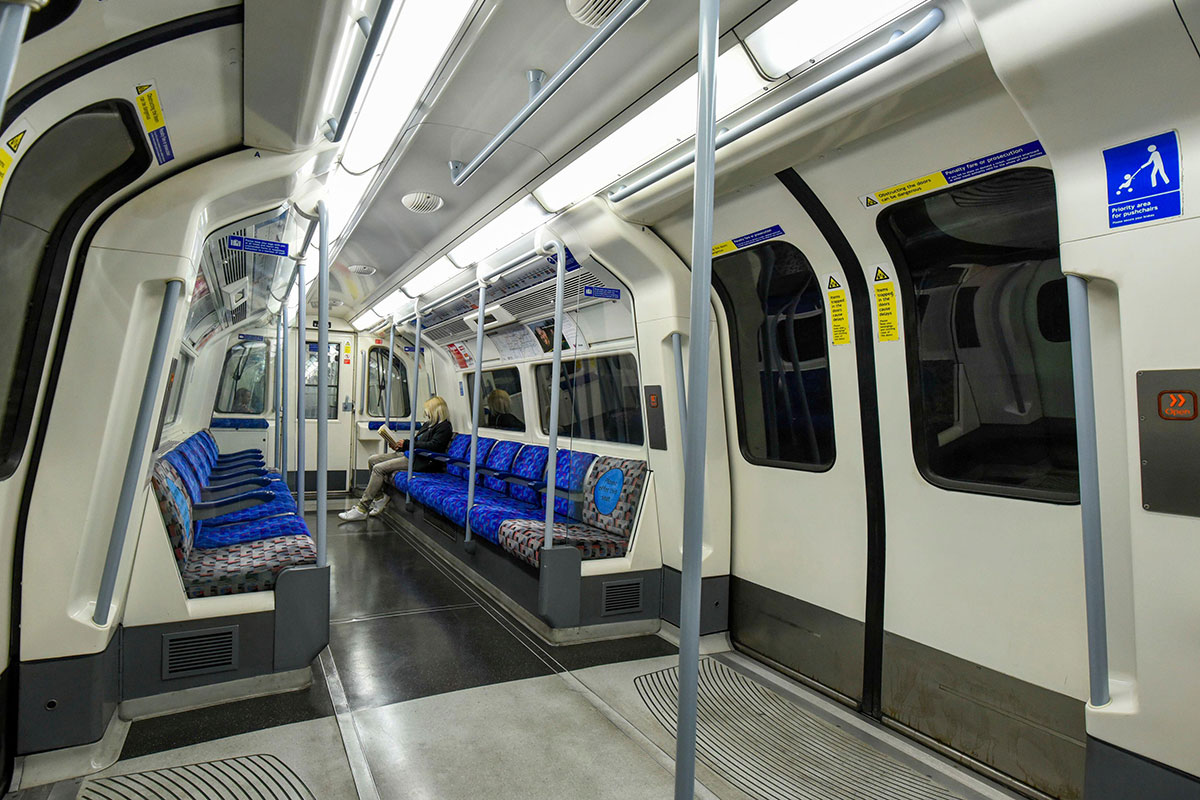‘Sometimes I cry. It’s very difficult for me, all of this’: lockdown and temporary housing
The lockdown has made things even more difficult for families in temporary accommodation. Lucie Heath finds out what it is like for them. Photography by Getty and Alamy
“Everything is too much right now,” Stavroula Tsakou tells Inside Housing over the phone from her London home.
Where she is sounds chaotic. Ms Tsakou interrupts the call to tell her children in the background to be quiet. When she returns, she is in tears. “Everything’s difficult, everything,” she says. “I am afraid and it’s too much stress sometimes. I cry. It’s very difficult for me, all of this.”
Ms Tsakou is speaking from Abbots and Levine Hostel in Camden, where she lives with her two children, aged three and 10.
They have one bedroom, a living room, bathroom and kitchen – all the rooms are separated by a communal corridor and some are on different levels. She is currently pregnant with her third child.
This family is one of thousands who are stuck in temporary accommodation during lockdown. Latest figures show that 88,330 households were living in temporary accommodation at the end of 2019, a 64% increase on 2009.
Despite its size, this group has remained largely invisible during the crisis. Both the government and media attention have mainly focused, understandably, on efforts to house rough sleepers.
Yet it takes more than a roof to stay safe during a pandemic. Of the 88,330 families living in temporary accommodation at the end of last year, 14,010 were living in B&Bs or hostels, meaning they are required to share facilities with other families.
Jasmine Basran, policy and public affairs manager at Crisis, says the charity is currently supporting many people who are living in this situation, some of whom are sharing kitchens and bathrooms with up to 10 other people.
“They’re really worried that they’re at heightened risk of COVID-19,” she says.
“As you can imagine, that’s really anxiety-inducing and a real strain on mental health.”
Some councils have responded by moving families living with shared facilities into self-contained housing. Newham Council, for example, has rented flats for almost 500 families.
However, Ms Basran says this situation has varied across the country. “We know some councils are doing extraordinary things and really doing as much as they can to support people into safe, self-contained accommodation,” she explains. “We also know some local authorities are really struggling with that and are struggling with the funding and with finding accommodation to be able to do that.”
One public authority that has kept some families in shared accommodation is the Home Office, which is responsible for housing thousands of asylum seekers.
In response, a Home Office spokesperson said it was unable to investigate the claims without more specific detail of the homes in question. It said accommodation providers were responsible for finding suitable properties.
Jane Williams is the founder of The Magpie Project, which supports homeless mums in Newham. She says some asylum-seeking families in the borough are forced to share facilities with up to five other families.
“We’ve got mums with pre-existing conditions or mums who are pregnant [that] are unable to self-isolate,” she says.
“We’ve got mums who have complained... that there were people staying over who are not members of the household and they’re worried about that, about the fact that there’s no social distancing or any kind of safety.”
Even during ‘normal’ times, Ms Williams says the conditions in these properties are “awful”, as issues include disrepair, rat and cockroach infestations, mould and plumbing problems.
It is not just families living in shared temporary accommodation that are facing a more difficult lockdown than most.
“If you’re in lockdown in a house or a flat that’s one thing. If you’re in lockdown with your whole family in one room, it’s a completely different pressure altogether,” says Vicky Fox, director of Doorstep, a charity which supports the families living in Abbots and Levine Hostel.
“You might have parents who are trying to work from home, you might have kids of varying ages from babies, toddlers up to young teens, some of whom might need to be doing distant learning. Trying to manage all of that in one room is super difficult.”
Ms Fox says that around half of the families Doorstep works with do not have access to the internet. Even for those who do, finding the space to concentrate on schoolwork can be challenging.
Sarah* has lived in Abbots and Levine Hostel for eight years with her 13-year-old son and five-year-old daughter.
She says she worries about her son being judged when he is doing distance learning with his classmates via a webchat.
People housed outside of their boroughs have to travel far on transport to get to work
For parents, being stuck in a confined space all day with only young children for company is incredibly isolating.
“What we found... was just about everybody wanted to have a chat,” says Ms Fox, who had been delivering food parcels to families in the hostel. “One single mum said she’s just so grateful for another adult to chat to for a little while, because she’s just in the room with two children 24/7.”
Doorstep has also been distributing leaflets to the families with information about what is happening in the local area. Ms Fox says many of the parents are keen to discuss the latest government guidelines as they do not understand what they mean.
“You’re in the dark, which makes you even more scared,” she says.
Meric Apak, cabinet member for better homes at Camden Council, said it is “working hard to provide tailored, around-the-clock support and advice for all our residents in Abbots and Levine”.
He added that at any given time the council is working on rehousing 500 families amid a national shortage of suitable accommodation.
Another group that is especially isolated during the pandemic are those who have been placed in temporary accommodation far away from their local authority.
“Right now it’s increasingly problematic because it means families are more isolated and disconnected from their support networks and community,” says Jorge Espiral, a member of Housing Action Southwark & Lambeth (HASL).
At the start of April, one HASL member was placed in temporary accommodation in Basildon by City of London Council.
For six weeks during the pandemic, his wife was forced to spend four hours a day commuting on public transport to her job as a cleaner in the city, while her husband and two children worried about her bringing the virus home. With the help of a lawyer, the family has now been moved to closer accommodation.
The easing of lockdown measures will make life easier for these families, but they will still be stuck living in overcrowded, poor-quality housing.
“The huge shortage of social housing means that temporary accommodation can be never-ending for homeless families,” says Mr Espiral.
A Ministry for Housing Communities and Local Government spokesperson said reducing the number of people in temporary accommodation is "a priority" for the government.
However, some of the families in Abbots and Levine Hostel have lived there for almost 10 years. Ms Tsakou has lived there for five and is not hopeful that things will change any time soon.
“Nobody cares. They just put people here and after that, they forget. They do nothing about them,” she says. “I want to get out of here and I don’t care where. Private, council, I don’t care. I just want to get out.”
*Name has been changed
More on coronavirus
To see all our coronavirus coverage to date – including the latest news, advice to providers, comment and analysis – use the link below.














